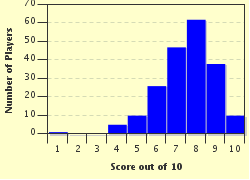Quiz Answer Key and Fun Facts
1. If someone is at a loose end, how would they be feeling?
2. If you "can't see beyond the end of your nose", what can't you see?
3. You are so tired, worried, or frustrated by something that you feel unable to deal with it anymore; perhaps you are overwhelmed. Which idiom is the best fit?
4. True or False: When someone meets a "sticky end" it means they have died, spilling a lot of blood.
5. When you come to the bitter end, what is another word that can be used to replace "bitter"?
6. "Not the end of the world" means a calamity, a huge disaster.
7. "The be all and end all" was coined by a famous Englishman. If something was described as such it would mean it was entirely suitable. To whom is this phrase attributed?
8. To burn the candle at both ends has a curious derivation. What is its contemporary meaning?
9. True or False. The phrase "Odds and Ends" is actually a corruption of the original phrase "Odd ends".
10. To play both sides against the middle means what?
Source: Author
1nn1
This quiz was reviewed by FunTrivia editor
ponycargirl before going online.
Any errors found in FunTrivia content are routinely corrected through our feedback system.


